SEO for Medical Professionals: A Practical Guide
19 Aug 2025 By: Vlade Legaspi
Updated
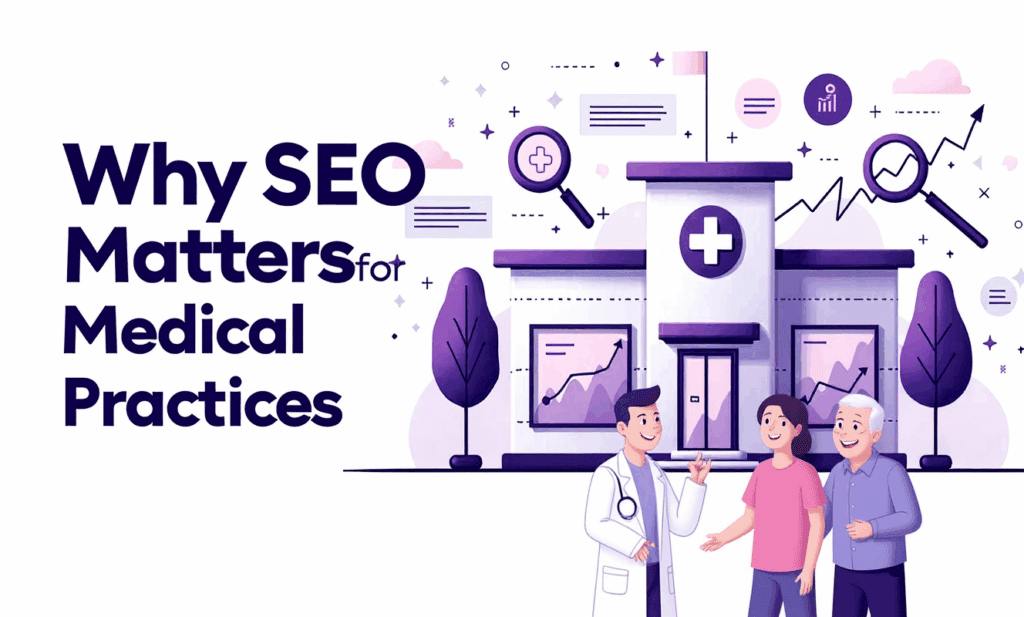
Why SEO Matters for Medical Practices
SEO for medical professionals is now a must, not a choice. Most people start their health search online, from symptoms to finding clinics or doctors. Without strong search visibility, practices miss key chances to reach patients who need care.
Good SEO for medical professionals builds trust in a crowded online space. When a clinic ranks high, it shows value and draws more bookings. This boosts patient trust and the clinic’s local reputation.
SEO for medical professionals also helps target the right people in the right places. Local keywords bring in nearby patients more likely to book in person. This grows traffic and builds stronger ties with the community.
Strong SEO for medical professionals includes helpful content like blogs, FAQs, and health tips. These guide patients, ease fears, and show the clinic as a trusted expert. In turn, patients feel informed and more likely to choose that provider.
Understand the Patient Search Journey
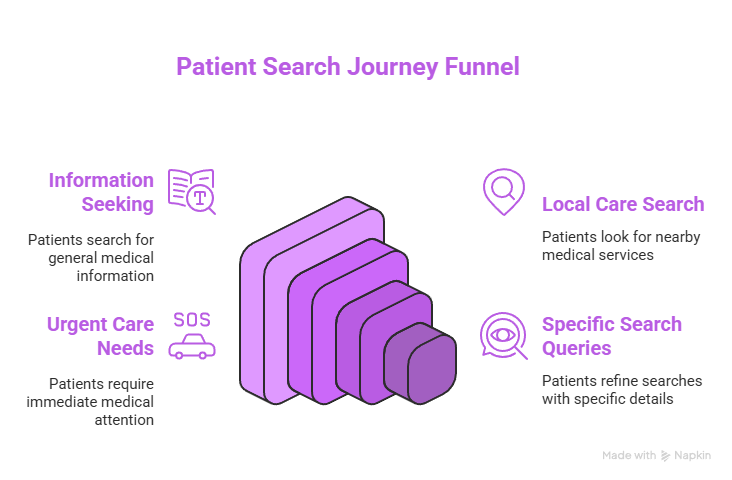
SEO for medical professionals should match patient search intent. Some search for info, others look for care nearby, and some want to book fast. Matching content to each type builds trust and drives bookings.
Search urgency affects what patients need. Someone searching “emergency ENT near me” needs fast help. SEO for medical professionals should guide each user to the right action.
As patients learn more, their searches shift from broad to specific. SEO for medical professionals must track these changes and give timely, helpful info at each step.
Patient age, tech skills, and language needs also shape searches. SEO for medical professionals should adjust to meet these needs and boost patient experience.
For practices that want measurable results, working with experts makes a clear difference. Livepage professional SEO services are designed specifically to help medical providers improve visibility, attract qualified local patients, and stay compliant with healthcare search standards.
Keyword Strategy: Speak the Patient’s Language
SEO for medical professionals should focus on real patient search terms. Use symptom and condition phrases with local tags like city or neighborhood. Add service-based queries too.
Pull keywords from tools such as Google SERP API, front desk questions, emails, and search suggestions. For strong SEO for medical professionals, group keywords by intent and link them to key pages.
Keep your keyword list fresh. Patient language shifts, and new treatments rise. Watch what rivals rank for to spot gaps and improve SEO for medical professionals.
Account for all patients by using synonyms and common terms. SEO for medical professionals works best when content mirrors how people talk about health.
On-Page SEO Fundamentals
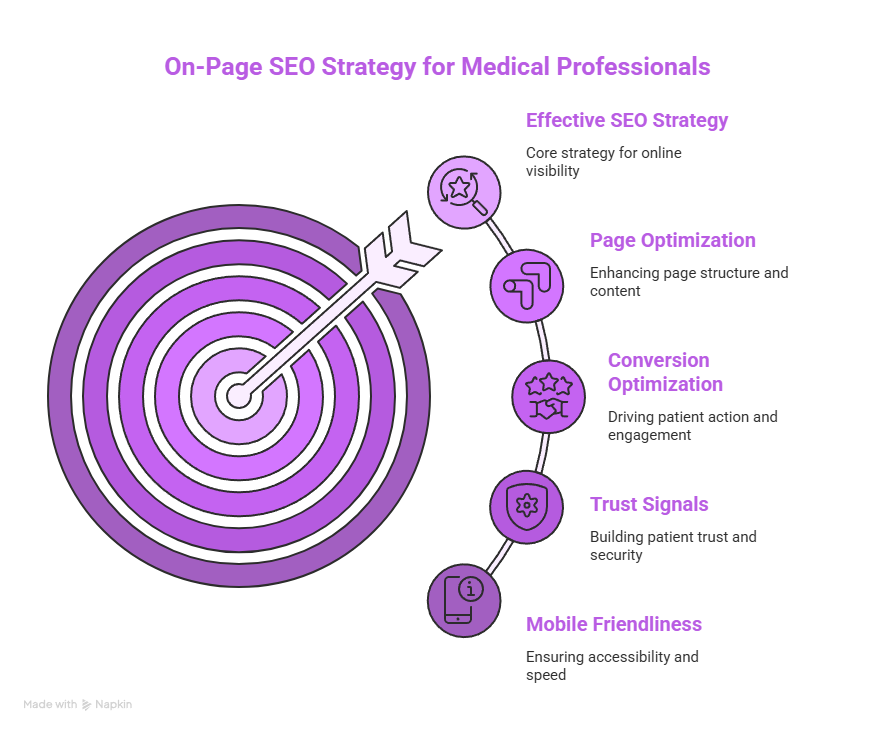
On-page SEO for medical professionals helps each page clearly show its topic. Use short meta titles with key terms and add a city or specialty when needed.
Write meta descriptions that sound helpful and friendly. These should tell patients what they’ll gain and why they should click your page.
Use clear H1 and H2 tags to organize content. For better SEO for medical professionals, place keywords early and use related terms throughout the text.
Add alt text and good file names to images. Link to other pages on your site to guide patients and boost your SEO for medical professionals.
Optimize Pages for Conversions
Medical professionals need to implement a particular call-to-action on each page for their most effective SEO strategy. Use prompts like book now, call, or start a telehealth visit.
Make contact info easy to find and match it across all pages. Use short forms and give flexible scheduling to fit all patient needs.
Placing reviews, ratings, or certifications near calls-to-action will help build trust. The trust signals establish an environment which enables patients to feel secure enough to take action.
Fast-loading mobile-friendly pages also support strong SEO for medical professionals. Using a free AI website builder can simplify this process by helping create responsive, optimized sites that perform well and attract more patients.
Content Strategy for Medical Websites
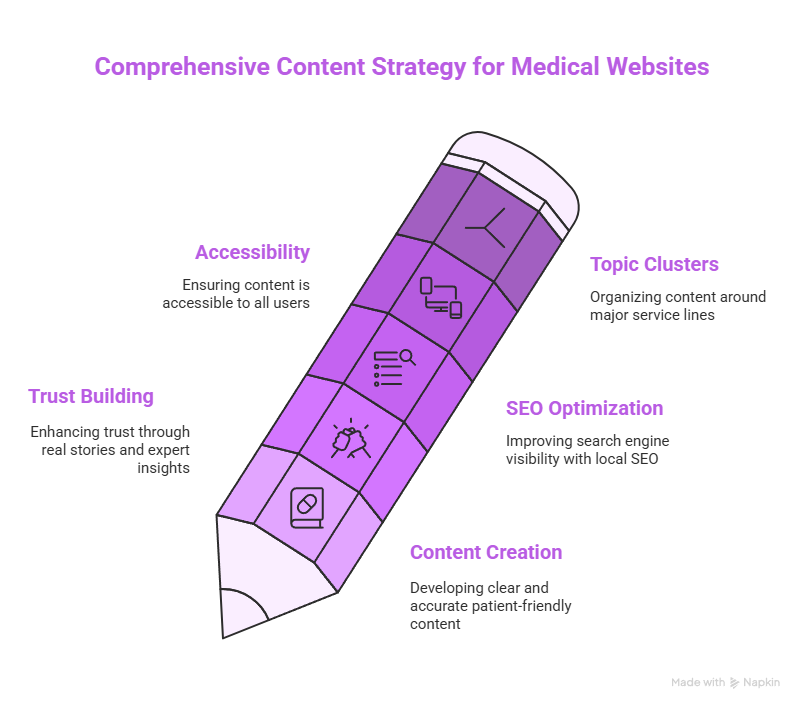
A strong SEO for medical professionals needs a steady content plan. Write blogs, guides, and FAQs in clear, accurate terms patients understand.
Add next steps like when to see a doctor or what to expect. This builds trust and lowers no-show rates.
Showcase what sets the practice apart. Use real stories, expert insights, and proven results to support SEO for medical professionals and show trust.
Update often with the latest facts. Use videos, charts, and tools to help users learn. Local SEO boosts reach in your area.
Make content easy for all to access. Use alt text, clear fonts, and simple layouts. This meets both patient needs and legal rules.
Topic Clusters and Internal Linking
Create topic clusters around major service lines. A main “pillar” page should address a wide subject such as “knee pain” while connecting to supporting pages about diagnosis, MRI, injections, surgical options, and rehab. Internal links help distribute authority across the site and guide users through a useful information pathway that supports decision making.
Local SEO: Be Found by Nearby Patients
Local SEO for medical professionals is key since most patients pick nearby providers. Start by claiming and filling out your Google Business Profile.
Keep your name, address, phone number, and hours the same on your site and in all listings. This boosts trust and search rankings.
Ask happy patients to leave reviews and reply to them with care. Reviews help SEO for medical professionals and guide patient choices.
Use local schema markup to show services, locations, and booking links. This helps search engines show the right local results.
Local Citations and Directory Listings
Consistent listings help SEO for medical professionals by building trust. Keep names, addresses, and phone numbers the same across all directories.
Wrong details can confuse search engines and hurt local rankings. Always check and update your practice info to stay accurate.
Join local sites, sponsor events, or join health forums. These actions earn backlinks and show your role in the local care network.
Use city names and landmarks in your content to boost SEO for medical professionals. Add contact info to every page for easy access.
Technical SEO Essentials for Medical Sites
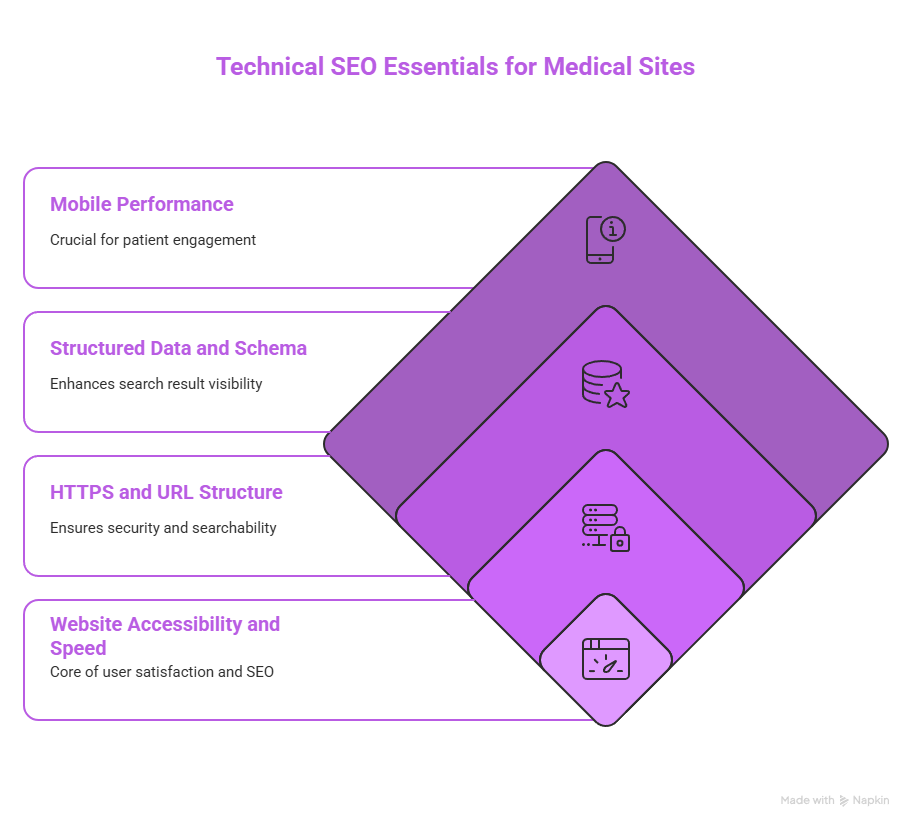
The website becomes accessible and fast through Technical SEO implementation. The speed of page loading impacts both user satisfaction and search engine rankings because images need optimization and scripts should be eliminated and server response times need to be reduced. Mobile performance is particularly important since many patients search on smartphones when seeking urgent care or appointments.
The site needs HTTPS encryption and a clean URL structure and an XML sitemap to help search engines find content. Use robots.txt carefully to avoid blocking important pages. Regularly check for crawl errors and fix broken links so users—and search bots—don’t hit dead ends.
Structured Data and Medical Schema
The implementation of schema.org structured data for medical entities and physicians and local business information enables search engines to display more detailed results. Medical schema enables the creation of rich snippets for reviews and FAQs and service offerings which enhances click-through rates. The use of schema for clinicians should include credentials alongside specialties and office locations to boost visibility.
Mobile Experience and Accessibility
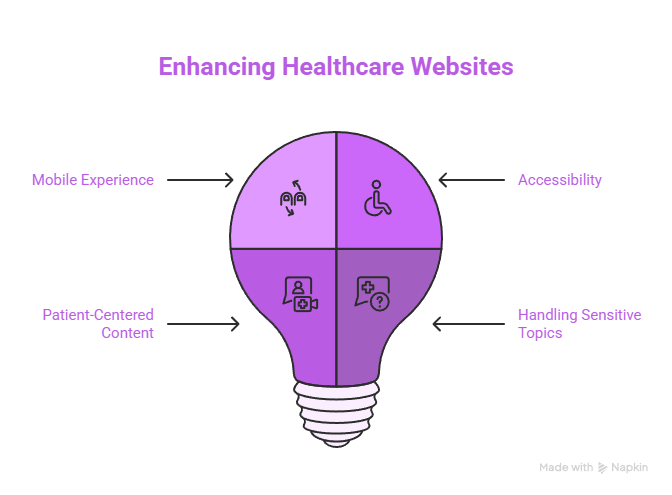
Mobile-friendly design functions as a ranking factor while simultaneously creating the experience that patients encounter. The text sizes together with tap targets and form fields need optimization for touch devices. The navigation system should be easy to use while contact features such as click-to-call and scheduling integration should work well on mobile devices.
Accessibility also matters: use descriptive alt text for images, provide transcripts for videos, and ensure the site follows basic WCAG guidelines. Websites that are accessible to everyone help healthcare providers reach more patients and decrease their legal and ethical risks especially for patients with disabilities.
Using a website accessibility checker can help medical practices quickly identify common accessibility issues such as missing alt text, keyboard navigation gaps, and contrast problems, making it easier to prioritize fixes alongside manual reviews.
Patient-Centered Content and E-A-T
Search engines use E-A-T criteria to rank content that shows expertise and authoritativeness and trustworthiness. Medical content requires authorship or review by qualified clinicians whenever possible. The addition of author bios with credentials and affiliations and links to professional profiles improves transparency and supports E-A-T requirements.
Clinical content must balance accuracy with readability. Avoid using medical terms that are not essential to the message. Always present clinical facts and treatment recommendations through reputable sources which include medical associations and peer-reviewed journals and institutional guidelines.
Handling Sensitive Topics and Medical Advice
The presentation should deliver information without bias while clearly stating the educational purpose of the content. Where appropriate, recommend contacting a clinician for personalized advice rather than replacing professional consultation. Provide clear instructions on when to seek immediate care and list local emergency resources if relevant.
Reputation Management and Reviews
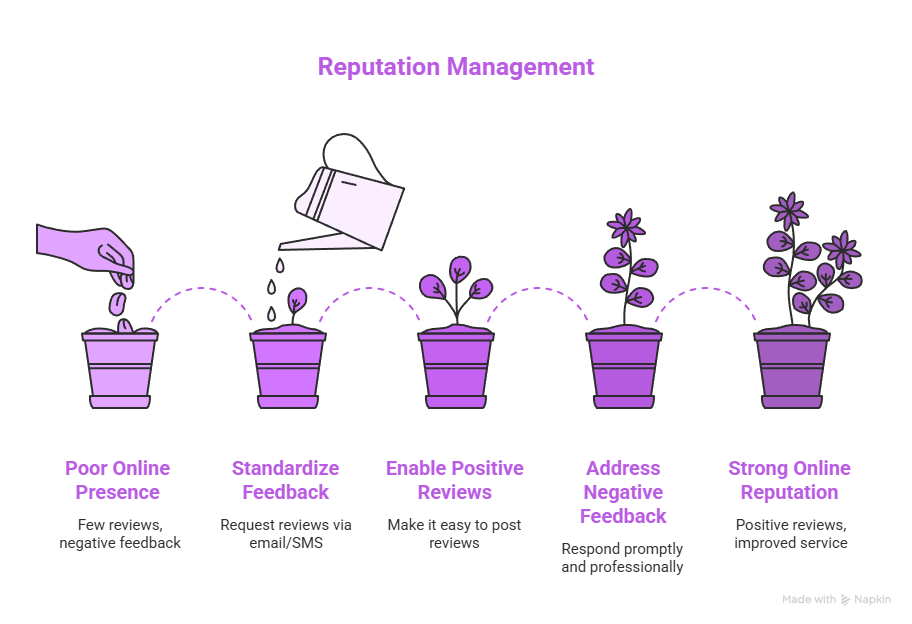
Online reviews determine which healthcare providers patients select for their care and which medical facilities search engines display at the top of their results. Establish a standardized feedback request process which sends email or SMS messages to patients after visits with a direct link to review their experience. The system should enable satisfied patients to post reviews and handle negative feedback through prompt professional responses.
Publicly addressing negative reviews transforms a bad experience into an opportunity to show excellent patient care. The quality of service improves when you show awareness of problems while proposing private discussions and describe the actions you have taken to address these matters.
Link Building and Partnerships
The establishment of domain authority depends on acquiring backlinks from authoritative medical sites and local organizations, and community partners. The links that patients earn typically stem from their access to high-quality educational resources and their involvement in research collaborations and sponsorship programs, and speaking events. For practices that want to strengthen authority without risky tactics, partnering with experts like Outreach Monks can simplify link outreach and secure placements on reputable sites in the healthcare space.
Search engines will penalize manipulative practices when you avoid aggressive link schemes or paid links. Develop resources which deliver actual value to others through the creation of detailed condition guides and patient handouts and local health reports. A white hat link building agency can help ensure all backlinks are earned through ethical, transparent strategies that build long-term credibility and trust with both search engines and patients.
Measuring SEO Success: Metrics That Matter
SEO for medical professionals should track real results, not just clicks. Focus on organic traffic, keyword ranks, CTRs, and bookings.
For local care, watch Google Business views and direction requests. These show how often patients look for your practice nearby.
Set goals in your analytics. Track which pages lead to bookings and which sources bring strong leads. This sharpens your SEO for medical professionals.
Use reports to see what works. Data helps guide your strategy and proves the value of your SEO and content work.
Common SEO Mistakes to Avoid
Common mistakes hurt SEO for medical professionals. Thin pages, repeated content, and poor mobile design push sites down in search.
Stuffing keywords or using shady tricks can also harm rankings and trust. Search engines spot these fast and penalize the site.
Missing backend fixes is another issue. Wrong NAP info, expired domains, or missing schema can all block SEO gains.
Run regular audits to catch problems early. Fixing them keeps your SEO for medical professionals strong and effective.
A Practical 90-Day SEO Plan for Medical Practices
Start SEO for medical professionals with a full audit. Check the site, Google profile, listings, speed, and mobile use. List top keywords by patient intent.
Fix meta titles, update local citations, and post helpful patient guides. These quick wins boost early results.
In days 30–60, add fresh content, use structured data, and speed up the site. Build local links through events and news. Track weekly and adjust as needed.
By days 60–90, make booking easier and add local pages. Review what content worked. Use results to shape your long-term SEO plan.
Working with Agencies vs. In-House Teams
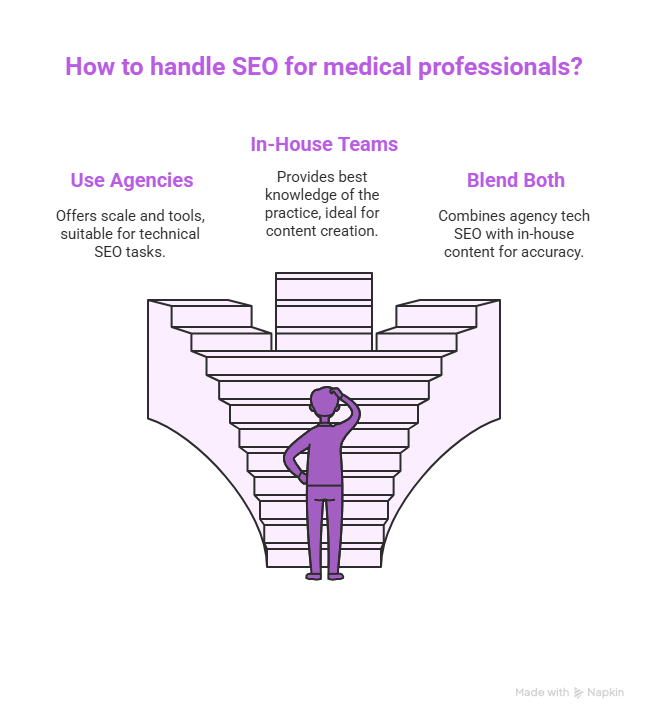
Choosing how to handle SEO for medical professionals depends on budget, skills, and goals. Agencies give scale and tools, while in-house teams know the practice best.
Smaller clinics can blend both. Use agencies for tech SEO, and create content in-house with doctor input to keep it accurate.
No matter the setup, set clear goals and check progress often. Share tasks clearly and review results on a set schedule.
Always involve clinical staff in content checks. This keeps info correct and supports trust, a key part of SEO for medical professionals.
Privacy, Compliance, and Ethical Considerations
Medical websites must comply with privacy regulations and professional standards. Avoid publishing identifiable patient information without explicit consent. Online forms and patient portals need to establish secure systems which protect both health data collection and storage processes. The system builds patient trust through clear privacy policies and secure communication channels which meet legal standards.
Medical board guidelines must be followed by advertising and claims which should not promise specific results. Before sharing testimonials or before-and-after photos you need to get written consent from the individuals and verify that all representations are truthful and verifiable.
Future Trends: Voice Search, AI, and Telemedicine
Voice search and AI-driven assistants are changing how patients ask questions. The content requires optimization to handle natural language queries and short answers for featured snippets in order to attract voice-driven traffic. Structured FAQs and conversational headings help content align with voice interactions.
Telemedicine growth also shifts SEO priorities. The platform should have separate pages that explain telehealth services as well as billing procedures and technical requirements. The platform should display availability information along with privacy protocols and virtual visit booking procedures to attract patients who want remote care services.
TRENDING NOW
Google handles 99,000 searches each second which requires all businesses including medical practices to achieve search visibility. SEO for medical professionals helps boost online presence, attract qualified leads, and build trust through informative and ethical content. Healthcare SEO differs from standard SEO because it needs to follow precise accuracy standards and privacy regulations and regulatory requirements. The objective surpasses ranking systems because it requires developing exact patient-centered content which enables patients to make informed health decisions while establishing trust with providers.
The success of healthcare SEO depends on three essential components which include on-page optimization and off-page optimization and local SEO strategies. The on-page strategies consist of keyword research and content creation and technical improvements which include fast load times and mobile design. The off-page strategies consist of link-building, online reviews and directory listings. Local SEO enables your practice to show up in searches for nearby locations through Google Business Profile and other tools. The regular implementation of SEO develops into a trust-building instrument which enables the attraction of local patients for sustained practice growth.
Conclusion: Making SEO Part of Patient Care
SEO for medical professionals extends patient access and boosts care quality. Strong search presence helps patients find trusted, clear info when they need it most. Done right, SEO drives new bookings, builds trust, and supports steady growth for your practice.
Start by performing a site audit followed by local listing corrections and content development that answers real patient inquiries. Track what leads to bookings and refine as you go. With ongoing focus on accuracy and patient needs, SEO becomes a key part of your care delivery.
Your practice needs smarter SEO to achieve growth. Join Helpsquad Health and start your free trial today. Take care services become accessible to patients through our platform which provides fast and simple connection options.


